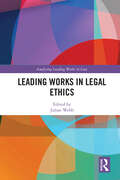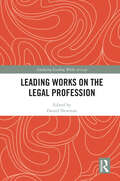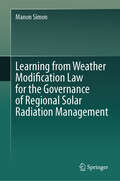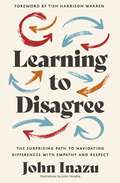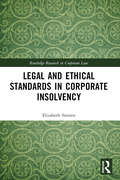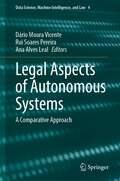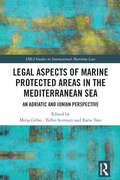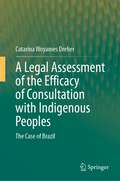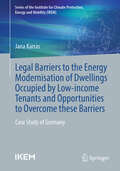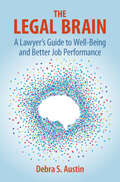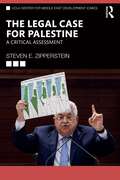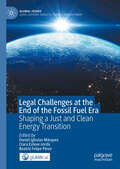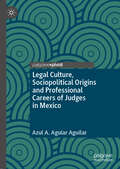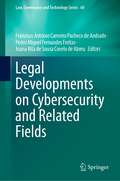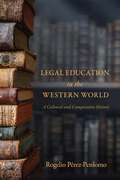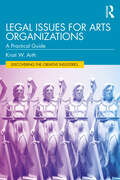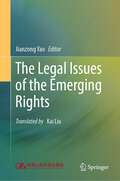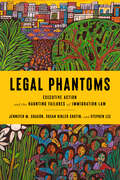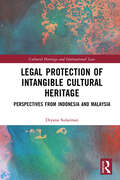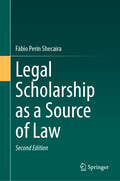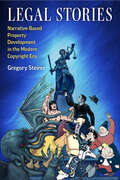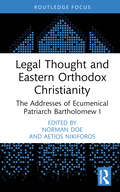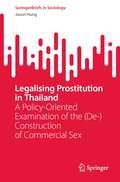- Table View
- List View
Leading Works in Legal Ethics (Analysing Leading Works in Law)
by Julian WebbThis volume reviews and takes stock of legal ethics, at a time when the legal profession globally is experiencing considerable change and challenges, through a re-evaluation of writings that are in some way foundational to the field. Legal ethics, understood here as the study of the ethics and professional regulation of lawyers, has emerged as a novel and important field of study over the last 50 years. It is also one that displays considerable diversity in its scholarship, with distinctive philosophical and interdisciplinary approaches emerging over the years to underpin and supplement the doctrinal ‘law on lawyering’. With contributions from leading and emerging scholars from the United States, Australia, Canada, the Netherlands, New Zealand and the United Kingdom, this collection offers not just critical insights into the authors’ chosen texts, but a thought-provoking commentary on the current state of legal ethics scholarship and its future directions. In addition to being an essential resource for scholars and students of legal ethics theory, it will also be of interest to academics and researchers in legal theory, the philosophy of law, and applied ethics.
Leading Works on the Legal Profession (Analysing Leading Works in Law)
by Daniel NewmanThis collection provides an innovative and engaging way of assessing the development of legal profession scholarship and its potential future development by presenting an analysis of the ‘leading works’ of the discipline. The book was written by prominent and emerging international scholars in the field, with each contributor having been invited to select and analyse a work which has for them shed light on what the legal profession is and what it does. The chapters explore the effect that the chosen work has had upon legal profession scholarship as a whole, both within particular jurisdictions and internationally. Contributors also reflect upon the likely implications of the leading work on the future study of and application to the legal profession. They relate the works to recent and contemporary developments in law and access to justice, such as the rise of technology, impact of the Covid-19 pandemic, and issues of funding, to highlight the interpretative value of such scholarship. Presenting an overview and introduction to the field of legal profession research, the collection will be required reading for researchers looking to study any aspect of the legal profession. It will also prove compelling for a wide variety of access to justice and justice system research projects. The book will also appeal to scholars interested in legal ethics.
Learning from Weather Modification Law for the Governance of Regional Solar Radiation Management
by Manon SimonThis book investigates the role of cloud seeding laws in governing regional solar radiation management (SRM) activities. It challenges the prevailing belief that cloud seeding laws are irrelevant to regional SRM governance and argues for their applicability. Through case studies in Australia, Canada, and the United States, the book highlights the need for legal frameworks that promote cross-scale interactions, stakeholder participation, flexible decision-making, and conflict resolution. It advocates for adopting adaptive governance principles to effectively manage the risks and uncertainties associated with regional SRM interventions. By filling a gap in the existing literature, this book offers valuable insights and recommendations for the governance of regional SRM, shedding light on the potential of cloud seeding laws to inform and shape SRM governance frameworks. It provides a comprehensive analysis of the legal and normative aspects, offering practical guidance for policymakers, researchers, and stakeholders involved in regional SRM initiatives.
Learning to Disagree: The Surprising Path to Navigating Differences with Empathy and Respect
by John InazuAre you discouraged by our divided, angry culture, where even listening to a different perspective sometimes feels impossible? If so, you're not alone, and it doesn't have to be this way. Learning to Disagree reveals the surprising path to learning how to disagree in ways that build new bridges with our neighbors, coworkers, and loved ones--and help us find better ways to live joyfully in a complex society.In a tense cultural climate, is it possible to disagree productively and respectfully without compromising our convictions? Spanning a range of challenging issues--including critical race theory, sexual assault, campus protests, and clashes over religious freedom--highly regarded thought leader and law professor John Inazu helps us engage honestly and empathetically with people whose viewpoints we find strange, wrong, or even dangerous.As a constitutional scholar, legal expert, and former litigator, John has spent his career learning how to disagree well with other people. In Learning to Disagree, John shares memorable stories and draws on the practices that legal training imparts--seeing the complexity in every issue and inhabiting the mindset of an opposing point of view--to help us handle daily encounters and lifelong relationships with those who see life very differently than we do.This groundbreaking, poignant, and highly practical book equips us to:Understand what holds us back from healthy disagreementLearn specific, start-today strategies for dialoguing clearly and authenticallyMove from stuck, broken disagreements to mature, healthy disagreementsCultivate empathy as a core skill for our personal lives and our whole society If you are feeling exhausted from the tattered state of dialogue in your social media feed, around the country, and in daily conversations, you're not alone. Discover a more connected life while still maintaining the strength of your convictions through this unique, often-humorous, thought-provoking, and ultimately life-changing exploration of the best way to disagree.
Legal and Ethical Standards in Corporate Insolvency (Routledge Research in Corporate Law)
by Elizabeth StretenRecent financial crisis and the global financial impacts of the COVID-19 pandemic have brought renewed interest to the regulation and practice of corporate insolvency and restructuring.Modernisation of the insolvency profession, and the regulation of its practitioners, is a contemporary concern and recent years have seen significant reforms of insolvency law. The success of such reforms can be enhanced through a clear understanding of difficulties faced by the insolvency profession in achieving successful restructuring and insolvency outcomes and through the determination of effective solutions to those difficulties. However, there is limited empirical data to inform the day-to-day practice of insolvency, nor the difficulties experienced by insolvency practitioners in pursing insolvency and restructuring solutions. This book addresses this absence of data and understanding, examining the role and practice of corporate insolvency practitioners and exploring the challenges that they encounter.Offering an empirical study together with a comparative analysis of the experiences of practitioners around the world, this book facilitates a greater understanding of corporate insolvency practice, confronting a misunderstanding of, and under-confidence in, corporate insolvency practitioners, making it key reading for academics, practitioners and regulators working in the area of corporate insolvency.
Legal Aspects of Autonomous Systems: A Comparative Approach (Data Science, Machine Intelligence, and Law #4)
by Dário Moura Vicente Rui Soares Pereira Ana Alves LealAs computational power, the volume of available data, IT systems’ autonomy, and the human-like capabilities of machines increase, robots and AI systems have substantial and growing implications for the law and raise a host of challenges to current legal doctrines. The main question to be answered is whether the foundations and general principles of private law and criminal law offer a functional and adaptive legal framework for the “autonomous systems” phenomena.The main purpose of this book is to identify and explore possible trajectories for the development of civil and criminal liability; for our understanding of the attribution link to autonomous systems; and, in particular, for the punishment of unlawful conduct in connection with their operation. AI decision-making processes – including judicial sentencing – also warrant close attention in this regard.Since AI is moving faster than the process of regulatory recalibration, this book provides valuable insights on its redesign and on the harmonization, at the European level, of the current regulatory frameworks, in order to keep pace with technological changes.Providing a broader and more comprehensive picture of the legal challenges posed by autonomous systems, this book covers a wide range of topics, including the regulation of autonomous vehicles, data protection and governance, personality rights, intellectual property, corporate governance, and contract conclusion and termination issues arising from automated decisions, blockchain technology and AI applications, particularly in the banking and finance sectors.The authors are legal experts from around the world with extensive academic and/or practical experience in these areas.
Legal Aspects of Marine Protected Areas in the Mediterranean Sea: An Adriatic and Ionian Perspective (IMLI Studies in International Maritime Law)
by Mitja Grbec Tullio Scovazzi Ilaria TaniProviding a comprehensive analysis of the current legal basis for the establishment and further development of area-based conservation tools in the Mediterranean Sea, this book explores provisions under international law and the relevant region frame works to explore transboundary marine protected areas (MPAs) and other effective area-based conservation measures (OECMs) implemented at sub-regional level. Under the European Union’s 2030 Biodiversity Strategy, EUmember States will be responsible for designating the additional protected and strictly protected areas, either by expanding or completing the so-called ‘NATURA 2000’ Network or under national protection schemes through the establishment of national MPAs, including possible transboundary MPAs and OECMs established in accordance with the provisions of the relevant regional seas conventions. This book provides a discussion of the juridical status of the Adriatic and Ionian Seas as parts of a wider enclosed or semi-enclosed Mediterranean Sea, followed by an assessment of the interrelation between global, regional, sub-regional and national legal frameworks on MPAs and OECMs. It offers a comprehensive analysis of the legal basis regarding the establishment of national and, where appropriate, transboundary MPAs and OECMs. Discussing relevant examples of good practice related to transboundary and MPAs, the book will provides an overview of the challenges and opportunities related to the establishment of a transboundary Mediterranean Specially Protected Area of Mediterranean Importance (SPAMI), based on the provisions of the relevant Protocol to the Barcelona Convention, as well as on the challenges and opportunities related to the establishment of a transboundary international marine park and on the feasibility of the establishment of one or more Particularly Sensitive Sea Areas (PSSAs) within the Adriatic and Ionian Seas, and beyond. The book will be of interest to policy makers, practitioners and academics with an interest in public international law, law of the sea and sustainable ocean governance.
A Legal Assessment of the Efficacy of Consultation with Indigenous Peoples: The Case of Brazil
by Catarina Woyames DreherThis book offers a novel perspective on consultation with indigenous peoples in projects of natural resource exploitation. Engaging with current debates in international law, the study introduces a multi-dimensional perspective on consultation understood to include self-determination and cultural rights. It analyzes evidence from several countries across the Americas and Africa and presents an original and in-depth case study of Brazil. The book assesses judicial and legislative cases, drawing on relevant literature, international treaties and supplementary information gained from expert interviews. This supports the work’s broader objective to explore legal facts as well as to evaluate the empirical evidence in light of theoretical considerations. It thereby expands the understanding of consultation as a right under national legal systems and considers practical ways on how to enforce domestic redress for avoiding legal indeterminacy. The conclusions of the analysis contribute to not only a better understanding of the subject matter but also showcase ways of how to improve the realities on the ground. The book puts forward a range of recommendations directed at national authorities, international organizations, development lenders and civil society to help improve the unsatisfactory present circumstances. The intended audience encompasses legal scholars, students, practitioners and journalists, as well as anyone interested in research on the realization of indigenous peoples’ rights and the role of international law in the 21st century.
Legal barriers to the energy modernisation of dwellings occupied by low-income tenants and opportunities to overcome these barriers: Case study of Germany (Schriftenreihe des Instituts für Klimaschutz, Energie und Mobilität)
by Jana KarrasThis book explores the legal barriers to energy modernisation in Germany's residential building sector, especially when low-income tenants are involved. It also examines potential solutions to the landlord-tenant dilemma and how they may be applied within the German legal framework. The book conducts an in-depth examination of the regulations, economic factors, and social dynamics that impede progress in energy efficiency improvements. Drawing upon extensive research, comparative case studies, and insights from the Swedish experiences, this book provides a comprehensive analysis of the challenges and opportunities surrounding the decarbonization of dwellings occupied by low-income tenants in Germany. The book explores the concept of energy poverty in Germany and Sweden, and how these countries address it (or don't) within their legal frameworks. It delves the reader into the complexities of German and Swedish legal systems and how they impact the ability to address energy efficiency in low-income housing. The reader can explore the landlord-tenant dilemma and the hurdles faced when trying to invest in energy modernization, with a special focus on low-income tenants. This book takes an in-depth look at the legal landscape, exploring both EU policies and national regulations. Sweden's experience, especially its use of municipal green bonds to finance energy transition projects, offers a valuable lesson for Germany. Drawing on comparative insights from Sweden, which has made strides in addressing similar issues, the book aims to identify transferable legal strategies to facilitate energy transition in the rental housing market. By dissecting the intricacies of regulations and legal frameworks, this book offers innovative solutions that can bridge the gap between climate goals and the realities faced by low-income tenants. This book is intended for a diverse audience, including policymakers, legal professionals, researchers, academics, environmentalists, housing authorities, and advocates for social and climate justice. It serves as an essential resource for those seeking a deeper understanding of the legal complexities surrounding energy modernization in low-income tenant-occupied dwellings and the pathways to surmount these barriers. It serves as a comprehensive resource for those dedicated to dismantling legal barriers to energy efficiency and advancing social and environmental equity.
The Legal Brain: A Lawyer's Guide to Well-Being and Better Job Performance
by Debra S. AustinThe Legal Brain is an essential guide for legal professionals seeking to understand the impact of chronic stress on their brain and mental health. Drawing on the latest neuroscience and psychology research, the book translates complex scientific concepts into actionable advice for legal professionals looking to enhance their well-being and thrive amidst the demands and stressors of the profession. Chapters cover optimizing cognitive fitness and performance, avoiding or healing cognitive damage, and protecting “the lawyer brain.” Whether you are a law student, practicing lawyer, judge, or leader of a legal organization, this book provides valuable insights and strategies for building resilience, maintaining peak performance, and protecting your most important asset - your brain.
The Legal Case for Palestine: A Critical Assessment (ISSN)
by Steven E. ZippersteinThis book critically analyzes the Palestinian legal arguments against Israeli occupation and in favor of Palestinian statehood.For the past two decades, Palestinians have chosen to pursue their claims against the Israeli occupation through litigation at the international courts. It is therefore appropriate, the author contends, to analyze the merits of the Palestinian legal claims separately from their political claims. To do so, the book comprises five parts: Part I addresses the role of international law in the conflict as well as Palestinian legal framing and lawfare. Part II recounts the relevant legal history, including the crucial legal implications of the Oslo Accords. Part III analyzes Palestinian legal claims regarding the West Bank and the Gaza Strip. Part IV assesses the Palestinian legal case for statehood. Part V analyzes Palestinian legal claims regarding Jerusalem. Ultimately, it is argued that the Palestinian legal case is weak even though the two-state solution continues to represent the most viable long-term political outcome to the conflict. Moreover, the author suggests that Palestinian leaders have repeatedly opted for conflict perpetuation through lawfare and violence, rather than conflict resolution through negotiation.Providing fresh insights into the claims and counterclaims of Palestinian legal arguments, the book will appeal broadly to anyone interested in the Israeli-Palestinian conflict and international law.
Legal Challenges at the End of the Fossil Fuel Era: Shaping a Just and Clean Energy Transition (Global Issues)
by Daniel Iglesias Márquez Clara Esteve-Jordà Beatriz Felipe PérezThis edited collection proposes a wide range of approaches to address the legal issues pertaining to the end of the fossil fuel era. While the fossil fuel era is coming to an end both because of the inherent limits of its resources and because of the need to prevent to further pump out CO2 in an already saturated atmosphere, the legal dispositions to ensure an ordered and rational shift toward cleaner energy still need to be developed. Not only in relation to CO2 emissions themselves but also in relation to the manifold issues related to environmental justice in an era of global climate change and global warming. This book is unique in that it provides a theoretical framework but also works to address cutting edge issues through a series of case studies.
Legal Culture, Sociopolitical Origins and Professional Careers of Judges in Mexico
by Azul A. Aguiar AguilarThis book explores the careers, professional trajectories and legal cultures of judges in the federal judiciary in Mexico. So far, there has been limited research on internal factors contributing to the understanding of judicial power dynamics in Mexico and other Latin American countries at large; this Work fills an important gap in the literature through its empirical investigation of internal legal cultures and judicial norms, offering new data, measurement strategies,and insights into the interactions between law, politics, norms, legal culture(s), as well as judicial behavior. Utilising an original survey, the chapters analyse judicial conceptualizations of role norms, legal cultures, proclivities for judicial activism, and judicial behavior. In so doing, this book contributes to understanding of underlying key internal factors of judicial activism or restraint, in turn moving forward the debate that seeks to explain judicial behavior reliant on internal and ideational perspectives. Complementing limited but existing studies of judicial politics in Mexico through its analysis of judges beyond those that sit at the Supreme Court, this book will be of particular interest to Latin-American judicial politics scholars due to its focus on the judicial power from internal perspectives as well as sub-national judges, filling a void in the literature vis-à-vis the study of courts in Latin America. This Work was originally written in Spanish, and the translation was done with the help of artificial intelligence. A subsequent human revision was done primarily in terms of content.
Legal Developments on Cybersecurity and Related Fields (Law, Governance and Technology Series #60)
by Francisco António Carneiro Pacheco de Andrade Pedro Miguel Fernandes Freitas Joana Rita de Sousa Covelo de AbreuThis book presents a fresh approach to cybersecurity issues, seeking not only to analyze the legal landscape of the European Union and its Member States, but to do so in an interdisciplinary manner, involving scholars from diverse backgrounds – ranging from legal experts to ICT and engineering professionals.Cybersecurity requirements must be understood in a broader context, encompassing not just conventional aspects, but also emerging topics. This can only be achieved through an interdisciplinary approach. Indeed, cybersecurity should be consistently considered in relation to cybercrime and/or cyber defense, while examining it through the lens of specific domains that are intertwined with various legal fields. Moreover, it is crucial to uphold ethical standards and safeguard fundamental rights, particularly regarding personal data protection.By adopting this comprehensive perspective, the significance of cybersecurity in the exercise of public authority becomes apparent. It also plays an essential role in upholding the fundamental values of both individual Member States and the EU as a whole, such as the rule of law. Moreover, it fosters trust, transparency, and effectiveness in market relations and public administration interactions.In turn, the book draws on the expertise of its authors to provide insights into ICT components and technologies. Understanding these elements holistically is essential to viewing every "cyber" phenomenon from a legal standpoint. In addition to the holistic and interdisciplinary approach it presents, the book offers a captivating exploration of cybersecurity and an engaging read for anyone interested in the field.
Legal Education in the Western World: A Cultural and Comparative History
by Rogelio Pérez-PerdomoLegal Education in the Western World provides an encompassing history of legal education from Ancient Rome to present day Europe and the Americas. Legal education is considered the locus of the formation of professional culture, and in this book Rogelio Pérez-Perdomo contributes to our understanding of its formation by paying attention to how legal knowledge is conceived, the way it is created and transmitted, and the social status of masters, professors, teachers, apprentices and students. He focuses on historical periods and societies that have influenced the current state of legal education. While these are established touchpoints used by historians and supported by a vast bibliographies in English, Spanish, French, Italian and Portuguese, this book also includes material often overlooked by historians. Ultimately, this concise and accessible history presents a panoramic view that highlights the strengths and weaknesses of approaches to legal education in different societies, and an examination of the shared idea of law manifested in them. This historical and comparative perspective will be useful to comparative legal scholars and legal historians interested in a more informed general approach to improving legal education.
Legal Gladiator: The Life of Alan Dershowitz
by Solomon SchmidtThe only biography of America&’s most controversial lawyer.Legal Gladiator is the story of perhaps the greatest lawyer in American history. It is the story of a poor, failing high schooler from Brooklyn who became the youngest professor in the history of Harvard Law School, where Ted Cruz, Natalie Portman, Mike Pompeo, Jamie Raskin, and others sat under his tutelage. It is the story of a passionate Zionist who advocated for Israel on the world stage and became a confidant of Israeli prime ministers, including Benjamin Netanyahu. And it is the story of a zealous young liberal who, as an old man, stood in front of the Senate to declare that they would be violating the Constitution by removing a Republican president he himself opposed. As a lawyer, Alan Dershowitz has had a major impact on the most notorious legal cases in modern U.S. history. From Claus von Bulow to Mike Tyson to O.J. Simpson to Jeffrey Epstein to Donald Trump, he has devoted his life to championing the bedrock principle of the American justice system: that every person—no matter how despised—has the right to a rigorous legal defense. Legal Gladiator explores Dershowitz&’s rise to prominence, gives the inside story of his most high-profile cases and controversies, and provides a shockingly intimate look into his personal life. Dershowitz gave author Solomon Schmidt unprecedented access to his personal and professional life, including his private archives at Brooklyn College and dozens of interviews with him virtually and in New York City, Miami, Martha&’s Vineyard, and Israel. This book includes exclusive interview content from Bob Shapiro, Jeffrey Toobin, Israeli Prime Minister Ehud Olmert, Glenn Greenwald, Rep. Jamie Raskin, Eliot Spitzer, Justice Stephen Breyer, Mike Huckabee, Woody Allen, Noam Chomsky, Jared Kushner, Geraldo Rivera, Mark Levin, Mike Pompeo, Megyn Kelly, Mike Tyson, Ted Cruz, Robert F. Kennedy Jr., O.J. Simpson, and Donald Trump, among others.
Legal Issues for Arts Organizations: A Practical Guide (Discovering the Creative Industries)
by Kristi W. ArthLegal issues touch every aspect of organizations in the creative and cultural sectors. This book teaches non-lawyer, arts administration professionals and students how to identify and manage legal issues common to arts organizations.Legal Issues for Arts Organizations demystifies common legal problems and helps readers to approach them proactively. With an easy-to-remember “issue-spotting” process, the book helps develop the average administrator’s “eye” for legal issues, so that the administrator knows when to do more research and when to seek out professional legal assistance. Written by a law professor and former intellectual property litigator with experience in arts policy and administration, this book provides a framework that arts professionals can use to navigate legal issues with increased confidence. It provides an overview of the American legal system, teaches a systematic process for identifying legal issues, trains administrators to read and understand contracts, gives practical advice for working with professional lawyers, and puts theory into practice with an applied learning component.Packed with practical tips and advice, this book provides a primer that every arts administrator and every arts- and nonprofit-management student will find immediately useful.A book adoption gift containing teaching support materials is available to instructors. To gain access, visit www.routledge.com/9780367771133.
The Legal Issues of the Emerging Rights
by Jianzong YaoThis book systematically discusses the contents of the administrative right to know, the right to information, the right to gene, euthanasia and other emerging rights. The purpose of this book is to attract legal scholars to pay attention to these right changes in the process of China's social transformation, analyze the basic laws of right changes under the specific background of China's society and provide a theoretical system model for the establishment of China's legislative right recognition and right relief system. The typical feature of contemporary China is all-round social transformation. In such a transitional period, the construction of democracy, legal system and political system in China is gradually unfolding and developing with its unique mode. In the construction of legal system and the practical operation of legal system, the concept of rights, the thinking of rights and the logic of rights have in fact been running through the social and legal practice in China fordecades since the reform and opening up and have always become its background, keynote and background. Its typical realistic symptom is that a large number of rights belong to "new" for "China" the germination and birth of the type. In this context, this book tries to combine the general theory with the specific reality of the right landscape and preliminarily explores and explains the generation mechanism, existence basis, development logic and basic connotation of the "new" types of rights, that is, the main "emerging" or "new" types of rights in the transitional Chinese society. The purpose of this book is to draw the attention of the colleagues in the field of law to the reality of the emergence and development of "emerging" rights in our society. At the same time, taking this as an example, I hope that the colleagues in the field of law can deepen the study of rights, especially from the general and macro-study of rights to the more specific and micro-study of rights.
Legal Phantoms: Executive Action and the Haunting Failures of Immigration Law
by Susan Bibler Coutin Jennifer M. Chacón Stephen LeeThe 2012 Deferred Action for Childhood Arrivals (DACA) program was supposed to be a stepping stone, a policy innovation announced by the White House designed to put pressure on Congress for a broader, lasting set of legislative changes. Those changes never materialized, and the people who hoped to benefit from them have been forced to navigate a tense and contradictory policy landscape ever since, haunted by these unfulfilled promises. Legal Phantoms tells their story. After Congress failed to pass a comprehensive immigration bill in 2013, President Obama pivoted in 2014 to supplementing DACA with a deferred action program (known as DAPA) for the parents of citizens and lawful permanent residents and a DACA expansion (DACA+) in 2014. But challenges from Republican-led states prevented even these programs from going into effect. Interviews with would-be applicants, immigrant-rights advocates, and government officials reveal how such failed immigration-reform efforts continue to affect not only those who had hoped to benefit, but their families, communities, and the country in which they have made an uneasy home. Out of the ashes of these lost dreams, though, people find their own paths forward through uncharted legal territory with creativity and resistance.
Legal Protection of Intangible Cultural Heritage: Perspectives from Indonesia and Malaysia (Routledge Studies in Cultural Heritage and International Law)
by Diyana SulaimanThe book examines whether the protection of Intangible Cultural Heritage (ICH) by Indonesia and Malaysia upheld the interests of the various communities from which the cultural heritage originates, and whether the laws recognise that cultural heritage is often shared with other states and communities.The legal classifications of various indigenous communities and the interpretations of ‘indigeneity’ in the two countries have presented problems in the context of ICH protection. The state is regarded as holding the intellectual property rights for some forms of ICH and this also posed problems in the implementation of the laws to protect the communities’ ICH. This book employs a community-based perspective and adopts a multidisciplinary approach in exploring questions of the rights to and benefits of heritage.This book will be useful for students, academics and policy makers with an interest in international law, heritage and intellectual property rights.
Legal Scholarship as a Source of Law
by Fábio Perin ShecairaThis book offers a philosophical analysis of the role played by legal scholarship in the written judicial decisions of different Western legal systems. Based on a positivist (and, more specifically, Hartian) theory of law, the book discusses the concept of a source of law and the possibility of including within that concept the writings of legal scholars. It also discusses the concept of authority and the structure of authority-based arguments, such as those that judges often employ when referring to legal scholarship in their judgments.
Legal Stories: Narrative-Based Property Development in the Modern Copyright Era
by Gregory SteirerTracing the emergence of what the media industries today call transmedia, story worlds, and narrative franchises, Legal Stories provides a dual history of copyright law and narrative-based media development between the Copyright Act of 1909 and the Copyright Act of 1976. Drawing on archival material, including legal case files, and employing the principles of actor-network theory, Gregory Steirer demonstrates how the meaning and form of narrative-based property in the twentieth century was integral to the letter and practice of intellectual property law during this time. Steirer’s expansive view of intellectual property law encompasses not only statutes and judicial opinions, but also the everyday practices and productions of authors, editors, fans, and other legal laypersons. The result is a history of the law as improvisatory and accident-prone, taking place as often outside the courtroom as inside, and shaped as much by laypersons as lawyers. Through the examination of influential legal disputes involving early properties such as Dashiell Hammett’s Sam Spade, H. P. Lovecraft’s Cthulhu Mythos, and Robert E. Howard’s Conan the Barbarian, Steirer provides a ground’s eye view of how copyright law has operated and evolved in practice.
Legal Tech als Motor für die deutsche Wirtschaft: Einflussfaktor der digitalisierten Rechtsdienstleistung auf unternehmerisches Handeln
by Cathleen HesselbarthDie Globalisierung und die damit einhergehende Vernetzung der Märkte führt zu einem steigenden Wettbewerbsdruck für Unternehmen. Mit diesem Globalisierungseffekt geht ein Anstieg des juristischen Regelungsbedarfs einher, so dass die Unternehmen vor der Herausforderung stehen, die rechtlichen Blickwinkel sowohl in ihren strategischen als auch in ihren operativen Entscheidungen mit einzubeziehen. Gerade kleine und mittelständische Unternehmen haben strukturell bedingt meist keine eigene Rechtsabteilung oder juristisches Fachpersonal, auf die sie bei der Bearbeitung solcher Themen zurückgreifen können. Somit stehen Sie vor der Wahl, sich stetig rechtlich beraten zu lassen oder tragen das Risiko von Fehlern und möglichen Bußgeldern, was zu einer Verschlechterung der Wirtschaftlichkeit führen kann. Die Unternehmen übertragen damit den steigenden wirtschaftlichen Druck auch auf den juristischen Sektor, der seine Dienstleistungen immer schneller und kostengünstiger anbieten muss. Gerade der juristische Bereich ist durch die Ressource Mensch geprägt, deren Kapazitäten endlich sind. Dr. Cathleen Hesselbarth zeigt, dass Legal-Tech-Anwendungen eine sinnvolle Ergänzung darstellen können, um den Zwiespalt zwischen begrenzten Ressourcen und immer schneller benötigten Informationen zu verringern und schafft gleichzeitig eine fachübergreifende Verbindung zwischen Wirtschaft und Recht.
Legal Thought and Eastern Orthodox Christianity: The Addresses of Ecumenical Patriarch Bartholomew I (Law and Religion)
by Norman Doe and Aetios NikiforosEcumenical Patriarch Bartholomew I, the spiritual leader of Eastern Orthodox Christians worldwide, has thought profoundly about the role of law as it applies to the church, to civic life in Europe, to human rights, to religious freedom, and to the environment. In this book, leading scholars across the world reflect critically on the significance of his legal thought for human flourishing, for Christian social teaching, and for Christian unity. His legal thought is summed up in five key public addresses that he has delivered around the world in recent years, on: church law as an ecumenical instrument; the role of religion in a changing Europe; Orthodoxy and human rights; religion and freedom; and climate change, ecumenical imperatives. The collection presents critical reflections on the legal thought in these five important, distinct, and topical fields of human life. Its ten chapters, with two chapters devoted to each of his five addresses, are written by leading scholars across the world from different Christian traditions with expertise in the fields studied. They provide an analysis of the legal thought of the Patriarch, explain its significance legally, theologically, and politically, and propose its unifying value for the whole of global Christianity today. The book will be essential reading for academics and researchers working in the areas of law and religion, legal philosophy, comparative canon law, theology, and ecumenical studies.
Legalising Prostitution in Thailand: A Policy-Oriented Examination of the (De-)Construction of Commercial Sex (SpringerBriefs in Sociology)
by Jason HungThis book problematises the socioeconomic and institutional construction of prostitution in Thai contexts, identifying the root causes that propel underprivileged, discriminated and deprived women and girls to enter the sex industry. The author considers Thailand’s tolerance of prostitution and sex trafficking, despite criminalising prostitution since 1960. In doing so, they explain how criminalising prostitution does not lower the odds of women and girls engaging in commercial sex, but rather, legally marginalises them from receiving the necessary social and healthcare support. The book highlights that neither can Thailand pragmatically practice a zero-tolerance stance against prostitution - primarily due to severe police corruption and its heavy reliance on the sex tourism economy to support the national economic growth - nor is Thailand willing to fully crack down on the domestic sex industry. Engaging in an evaluation of how legalising and decriminalising prostitution, along with continuing to implement policies and interventions that alleviate the root causes of prostitution, can help Thailand build a more inclusive society and less-prostitution-reliant economy in the long term, the book provides a nuanced understanding of the relationships between society, inequality, governance, criminality, and policy in Southeast Asian contexts. It is relevant to students and researchers in sociology, socio-criminology, public policy, government and Southeast Asian studies.
